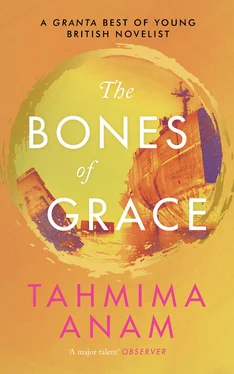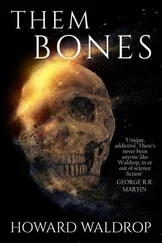We kept going. In my excitement I thought little about the conversation I’d overheard, and within a week or two it had faded from my mind. Things had a tinge of the hallucinogenic about them. Inch by inch, we pared away the rock that encased Diana. It was late October now, and the afternoons were cooler, so we worked through the day, stopping only when the light faded to grey. Our quarrying was almost finished, when, one evening, as Jimmy and I were cataloguing small bone fragments, Bart entered the tent, followed by a man in an army uniform.
‘I want a detail of your activities,’ the man said to Bart, looking around and drawing a circle with his finger that encompassed it all. He was wearing a cap and ironed trousers. Multicoloured lapels.
‘I told you,’ Bart said, ‘we’re just scientists. We look for fossils. We found one a few weeks ago.’
‘It was not in your daily report. We had to read about it in the paper.’
Bart looked around him. ‘This isn’t the place to discuss it,’ he said.
‘We will decide what is the place.’
The man went to Bart’s table and ran his hands through a pile of paperwork. A few sheets slid to the ground. I wondered if my story about Ambulocetus was among them.
‘General Alam no longer trusts you to give him what you promised.’
‘We are about to make history.’
‘You are no longer free to make your history here.’
At that moment, Zamzam entered the tent. In his hand was a chisel. Bart looked at the officer, then at Jimmy and me, and then at Zamzam, who turned around and attempted to run. He made it two steps when the officer took hold of his arm and flung him to the ground as if he was no more than a small dog. Then he crouched down and held Zamzam by the throat. Zamzam gasped for breath, hacking unproductively at the officer’s foot with his chisel.
It comforted me to recall the last woman I had met, an auntie who had sat beside me on the flight from Doha. She had asked whether I was married, and I had felt compelled to tell her I was engaged to a very nice man from back home. I tried to bring it to mind now, her hair-spray scent, the way she called me ‘darling’.
‘Do you know, Professor, the punishment for harbouring a terrorist?’ he said, his knee on Zamzam’s chest.
‘Please call my father,’ Zamzam whispered. The officer punched him, and Zamzam’s face swivelled sharply. I found myself moving towards him, taking a piece of cloth from my jacket (used, yesterday, to dust our half-discovered treasure), attempting to staunch the blood flowing from his mouth.
The officer turned to me. ‘Please remove yourself, madam.’
‘He’s only a curator,’ I said.
The officer tilted his head. ‘What else would he be?’
‘Leave it,’ Bart said, when Jimmy rose to his full height, dwarfing the rest of us. ‘There’s nothing we can do.’
‘He hasn’t done anything,’ I repeated. I didn’t know why I was talking.
Jimmy came towards us and I was afraid and hoping he would start a fight. He pulled me away as the second blow landed on Zamzam, aimed at the exact same place, a wound upon a wound, and that was when a drop of blood travelled onto my retreating hand. Jimmy carried me to my tent.
‘Don’t move,’ he said, pulling down the zip.
I waited inside.
I heard Zamzam being dragged out, his soft struggling, boots against the sand, a car door slamming shut. Within seconds they were gone. Jimmy unzipped my tent and pulled me out. I must have been crying, but I don’t remember exactly, just that everything became blurred. Bart was arguing with one of the soldiers, and the soldier was just standing there and staring down at him, and after a few minutes Bart followed him into a jeep, calling out to us to take care of Diana.
Jimmy and I debated what to do. We could try and get her out of the ground. Zamzam had showed us how he was going to wire the site, where exactly he was going to place the dynamite. But even if we were able to control the blast, what would happen after? We had no way of shifting the bones, no hope of getting across a border with them. We had no other option but to cover the fossil over as best we could. For months after, this decision would continue to haunt me.
Jimmy and I drank the last of the whisky and spent the afternoon hiding Diana. We filled in the quarried area with sand and packed everything down with shovels. We removed the cordon, the markers, the outlines we had drawn. Our movements were hurried and messy. Jimmy rolled a cigarette and we passed it back and forth. Finally, when it was too dark to see, we gave up and made our way back to camp. I tried to make a few phone calls on the satellite phone, but I couldn’t get through to anyone. I even tried you, Elijah. I remember thinking you would have known what to say at this moment, that you wouldn’t go on about what a bad idea it had been to come here in the first place. I had an awareness of being in danger, but mostly I thought about Zamzam. I wondered if he was dead, or if he was somewhere that made him want to be dead. And I feared for Diana, that she would, like Baluchitherium , remain entombed, never to be fully known.
Jimmy rifled through Bart’s things and found another bottle of whisky. We kept drinking. I went over and over in my mind the look on Zamzam’s face when that second punch landed, the fight fleeing so suddenly from his features. Of course the more I thought about it, I realised it wasn’t his arrest that was strange, it was our being there in the first place. Jimmy told me about the arrangement that Bart had made with the army. He had promised to keep an eye on Zamzam in exchange for permission to excavate, and he had promised Didag Baloch that he would try and find out General Alam’s next move. He had played both sides, but he hadn’t bargained on Zamzam’s worth, that the army would have wanted more — they would have wanted Zamzam himself, because Zamzam would give them leverage, something to bargain with in their battle for the area. Jimmy was cursing himself, saying he had tried to warn Bart, but Bart had promised him he’d had it all under control.
All this time, Zamzam had been our secret weapon. Our little talisman against the dangers of the desert. Now that he’d been arrested, perhaps his father would come to us, search through our carefully documented collection of broken geology for a clue to the betrayal of his son. I was too full of regret to fear this, wishing I had paid more attention, had somehow got the measure of Zamzam, or Bart, before this very moment when it was all too late.
In the morning Bart returned in an army jeep. It was unclear whether he’d been arrested — he wasn’t in handcuffs, but there was a man with him and whatever this man told him to do, he did. Below his forehead, his face had collapsed into troughs and craters, and he had stopped chewing betel so his mouth was pale and undefined. We were ordered to dismantle the camp. ‘I’m sorry,’ Bart murmured to me. ‘I’ll write to your adviser and explain.’
We packed our things into the jeep. The driver wore metal-rimmed sunglasses and blasted the air conditioning. He drove us down to Sui, where we boarded a tiny plane for Sukkur, where we changed to another flight bound for Karachi. At the ticket counter in Karachi, we changed our reservations, paid the airport taxes, and made declarations on our customs forms. Chisel. Hammer. Liquid plastic. There were no samples, no fragments of Diana encased in rock; we had just left her there, unmarked and unprotected. Jimmy repeatedly asked Bart if there was anything more we could do for Zamzam, if there was someone he could call to pull strings and get information on where they were holding him. Bart, a dead look in his eye, didn’t reply. He kept glancing at the man who had accompanied us from Dera Bugti. At one point, Jimmy declared he wouldn’t get on the plane, that he would remain in Pakistan until Zamzam was released, and Bart hushed him, putting his hand on Jimmy’s enormous forearm.
Читать дальше












